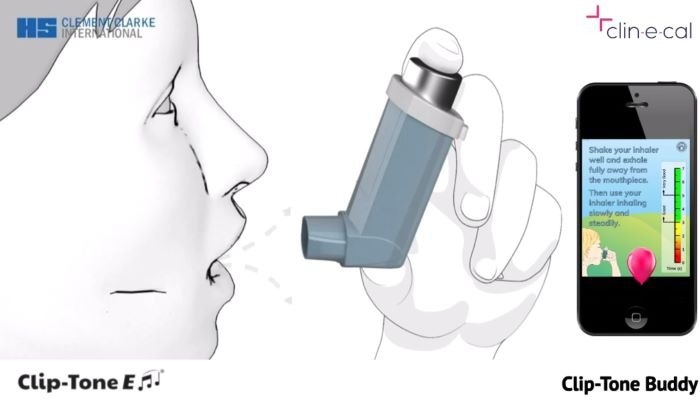A device costing just pennies, based on an idea by a University of Manchester Professor to help his son use an inhaler, could be a gamechanger for asthma patients.

Image Credit: University of Manchester
The impressive results of a small scale randomized controlled trial called the Clip-Tone System -comprising a simple inhaler add-on and a smartphone app - was funded by National Institute for Health and Care Research and Asthma + Lung UK .
The smartphone app created by Clin-e-cal, a digital health company spun-out from the University of Manchester and supported by Clement Clarke International, helps patients learn to use their inhalers properly.
The Clip-Tone System provides day to day guidance feedback to steer inhaler users towards correct inhaler technique.
And as up to 90% of inhaler users do not use their inhalers correctly, the system is likely to improve efficacy of treatment given via inhaler
Clip-Tone System builds on a simple whistle - the Clip-Tone manufactured by Clement Clarke International - that clips onto the inhaler’s canister, and sounds when a user inhales. The acoustic signal is picked up by the Clin-e-cal smartphone app, giving real time feedback on good or poor technique.
Professor Tariq Aslam, who is also a consultant ophthalmologist, designed the original prototype software 10 years ago for his then 4-year-old son Rafi, who needed to use a special form of asthma inhaler for children.
At times, Rafi needed to take an inhaler every four hours but found he found it traumatic and hard to accept the mask and spacer device pressed against his mouth in his wheezy state.
A microphone built into the inhaler’s mask is picked up by software designed by Prof Aslam, which allowed a cartoon robot to progress through various storylines, like knocking over obstacles with footballs, when Rafi used the device properly.
The device he called the Rafihaler helped his son master the technique and was then able to take his medication properly and miraculously without distress.
My son Rafi really struggled to take his inhaler which was so stressful and frightening for us all. I was determined to do something about it and so designed a system on a shoestring which could help train him.
Not only it did it work spectacularly, he actually found the experience enjoyable. It was utterly transformational- and from that time on Rafi was able to take his asthma meds when he needed them.”
Tariq Aslam, consultant ophthalmologist, University of Manchester
After joining forces with Clare Murray, Professor of paediatric respiratory medicine at The University of Manchester the smartphone feedback system was redesigned to replace the microphone and take advantage of the Clip-Tone training tool, which enabled adult users to be guided by both acoustic and visual stimuli.
The randomized control trial of 117 adults, led by Professor Murray, analysed the efficacy of the Clip-Tone System (CTS) in asthmatic patients over 1, 3 and 6 months, using a scoring system for the inhalation technique and measuring the mean inhalation time.
The patients using the system significantly improved their technique to achieve a near perfect score, and significantly increased their inhalation time which was maintained for the duration of the study.
Focus groups also revealed that some patients didn’t realize they had been using their inhalers incorrectly. Others got so used to using the training device, they felt uncomfortable taking their meds without it.
Professor Murray said: “Inhaler therapy is the mainstay of treatment for airway disease and is highly effective if taken correctly.
“However, of the 70% of inhalers supplied in the UK which are pressurized metered dose inhalers, around 90% of users have poor inhaler technique.
“Inhalation flow rate, duration of inhalation, and poorly timed actuation are common mistakes.
“The inability of patients to take the correct dose will inevitably mean that treatment is not optimal which is highly stressful for patients and can result in ongoing symptoms.”
She added: “Our trial showed that the Clip-Tone System teaches patients to increase the length of their inhalation time as well as improving coordination.
“We think the system may be a useful low-cost approach for the initial training of patients to use inhalers, but also could be helpful to maintain improved inhaler technique.
“It may also have the potential to lead to fewer side effects and improve asthma control.
The Clip-Tone is not currently available for sale but the inventors hope a partner can be found to bring this device to the market to serve the many patients it could help.